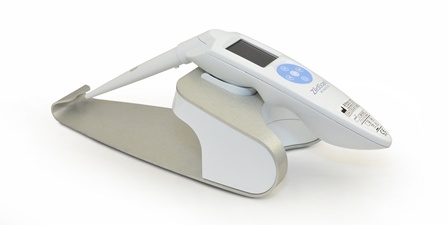Sponsored • Diagnostic device
Clinical data shows increased detection of cervical cancer
A pioneering diagnostic device identifies more abnormal cells on the cervix than standard colposcopy, according to data published in two European clinical papers.
ZedScan is a portable, handheld device which uses Electrical Impedance Spectroscopy (EIS) technology to detect dysplasia and cancer of the cervix. It can measure and detect tissue changes in women identified with an abnormal smear test.
UK research published in the European Journal of Gynaecological Oncology (EJGO) shows ZedScan, an adjunct to colposcopy, increases the detection of high-grade CIN in women referred with both low-grade and high-grade abnormal cytology.
The combination of ZedScan and colposcopy improved the outcome of women who were treated at first visit with over 95% having high-grade CIN on histology.
The second paper published in the European Journal of Obstetrics and Gynaecology (EJOG), examines the influence of HPV genotypes on colposcopic performance. It also reveals by using ZedScan, more high-grade CIN is detected irrespective of HPV genotype.
Speaking about the results lead researcher and colposcopist, Prof John Tidy, Professor of Gynaecological Oncology, said: “Colposcopy as a clinical examination has remained mainly unchanged for 90 years and relies on visual indicators. This means it is a subjective interpretation and in some cases patients can be overtreated or disease can be overlooked. Using ZedScan as an adjunct to colposcopy however increases detection and enables clinicians to make better informed decisions at a patient's first visit.”

The increased detection of high-grade CIN means the combined examination is more sensitive when compared to colposcopy alone. A negative colposcopic impression and ZedScan is very effective at excluding the presence of high-grade CIN so permitting discharge to community based cervical screening. The combined examination also allows more timely and appropriate management of women referred to colposcopy.
“The reason why this data is so important is it will help us with the forthcoming changes to screening programmes in the UK. From 2020 women aged 25 will have been vaccinated against HPV16 & HPV18 and will enter the UK cervical screening programmes,” said Prof Tidy.
“The proportion of women referred to colposcopy with HPV16 infection will be fewer, however women with HPV O (other high risk) genotypes will continue to be referred. Any high-grade CIN associated with HPV O infections will be more difficult to detect because of the lack of aceto-white change associated with these lesions. The addition of ZedScan, a non-visual diagnostic, will help to improve the detection of high-grade CIN in the women referred to colposcopy as we move into a post HPV vaccinated screening population.”
The ZedScan system was developed by UK company, Zilico Ltd, following a collaboration between the University of Sheffield and Sheffield Teaching Hospitals NHS Foundation Trust. It consists of a portable handset, docking station, a single use sensor and software application.
The non-invasive device takes 10–12 readings around the cervix, which takes approximately 2 to 3 minutes. It analyses the underlying tissue structure that identifies disease giving clinicians additional information which helps them better manage the patient at the initial examination.
Source: Zilico Ltd.
20.07.2017







